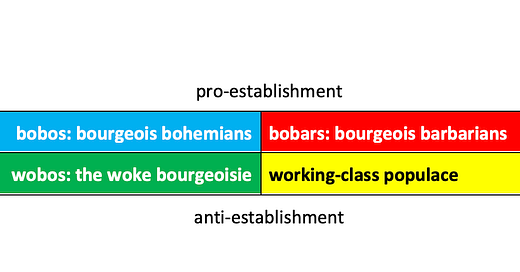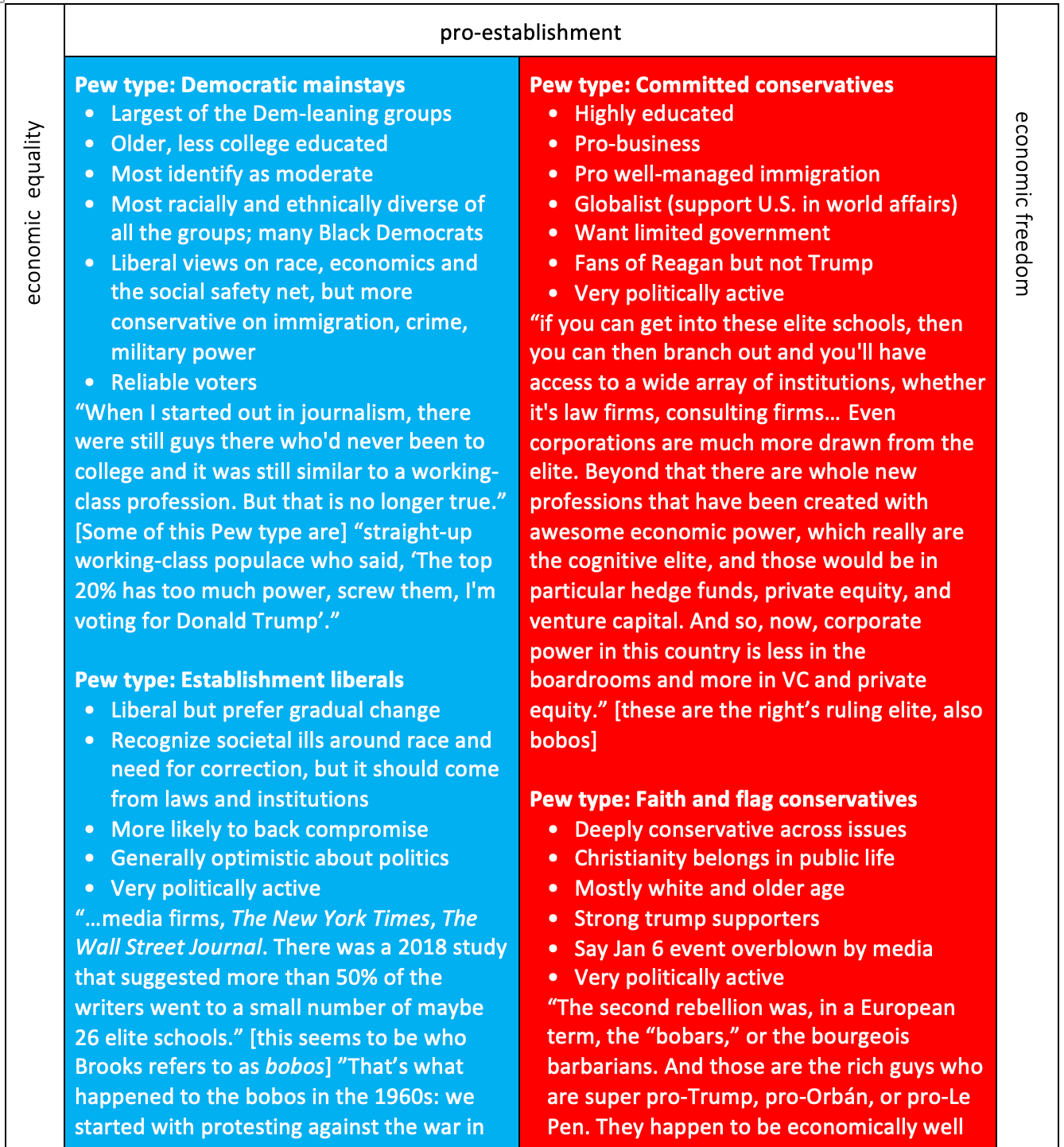David Brooks' Book "Bobos in Paradise" Analyzed thru the Political Compass
With Comparison of Pew Political Types
David Brooks coined the term bobos in his book Bobos in Paradise: The New Upper Class and How They Got There. Bobo is a portmanteau of "bourgeois" and "bohemian." This social group blends the capitalist, success-oriented values of the bourgeois with the countercultural, free-spirited values of the bohemian. Brooks describes them as a new elite that rose in the late 20th century, particularly in the 1990s. This group is characterized by its high levels of education, professional success, and cultural influence.
I think of bobos as most exemplifying the older liberal elite that fits the Pew type establishment left. According to Brooks, bobos often exhibit a mix of seemingly contradictory behaviors. They can be highly materialistic, indulging in expensive goods and services, but they also value authenticity, social consciousness, and a sense of "doing good." They often try to reconcile their affluence with their liberal values. They value meritocracy, in contrast with the green quadrant. In short, Brooks uses the term to describe a modern upper class that has found a way to merge the values of the 1960s counter culture with the values of the 1980s yuppies. Brooks states the following, which highlights the establishment and anti-establishment divide:
It's not just economic power; it's cultural and social power. I keep coming back to this French intellectual, Pierre Bourdieu, who said class difference is not just about economics; it's about cultural capital and social capital. It's the way you can show yourself off, the words you can drop, the musical tastes you have. And in all these ways, I do think we are becoming bifurcated. (David Brooks on Yasha Mounk’s podcast The Good Fight)
Brooks introduces these terms (tho he doesn’t place them in the quadrants). This is oversimplified, in ways the next section will clarify.
Pew Research Center Survey Results
A Pew Research Center survey of the U.S. general public, in 2021, showed clusters of political beliefs and values. The origin of these Pew labels and type descriptors are detailed in an earlier post. Below, the bulleted items are from the Pew research; however, Pew researchers did not place their types in the quadrants framework.
David Brooks did not link his ideas to the Pew types. In the podcast quoted above, he talked about many segments of society, which seem to match my conceptualization of the Pew types. The quotes in the quadrants are from the podcast.
Thanks for reading. Here’s a related article: Post-election Realignment Update.
Repeat of Quadrants Content
This section repeats the writing in the quadrants, for any who have difficulty reading in that format. Groups are presented in order of political party size.
Auth-left Quadrant
Pew type: Democratic mainstays (moderate Democrats)
• Largest of the Dem-leaning groups
• Older, less college educated
• Most identify as moderate
• Most racially and ethnically diverse of all the groups; many Black Democrats
• Liberal views on race, economics and the social safety net, but more conservative on immigration, crime, military power
• Reliable voters
“When I started out in journalism, there were still guys there who'd never been to college and it was still similar to a working-class profession. But that is no longer true” [some of these are] straight-up working-class populace who said, “The top 20% has too much power, screw them, I'm voting for Donald Trump’.”
Pew type: Establishment liberals
• Liberal but prefer gradual change
• Recognize societal ills around race and need for correction, but it should come from laws and institutions
• More likely to back compromise
• Generally optimistic about politics
• Very politically active
“…media firms, The New York Times, The Wall Street Journal. There was a 2018 study that suggested more than 50% of the writers went to a small number of maybe 26 elite schools.” [this seems to be who Brooks refers to as bobos] ”That’s what happened to the bobos in the 1960s: we started with protesting against the war in Vietnam and we ended up with Whole Foods.”
Auth-right Quadrant
Pew type: Committed conservatives
• Highly educated
• Pro-business
• Pro well-managed immigration
• Globalist (support U.S. in world affairs)
• Want limited government
• Fans of Reagan but not Trump
• Very politically active
“if you can get into these elite schools, then you can then branch out and you'll have access to a wide array of institutions, whether it's law firms, consulting firms… Even corporations are much more drawn from the elite. Beyond that there are whole new professions that have been created with awesome economic power, which really are the cognitive elite, and those would be in particular hedge funds, private equity, and venture capital. And so, now, corporate power in this country is less in the boardrooms and more in VC and private equity.” [these are the right’s ruling elite, also bobos]
Pew type: Faith and flag conservatives
• Deeply conservative across issues
• Christianity belongs in public life
• Mostly white and older age
• Strong trump supporters
• Say Jan 6 event overblown by media
• Very politically active
“The second rebellion was, in a European term, the “bobars,” or the bourgeois barbarians. And those are the rich guys who are super pro-Trump, pro-Orbán, or pro-Le Pen. They happen to be economically well off, but they're offended by the bobos, and they adopt opposite social manners.”
Lib-right Quadrant
Pew type: Populist right
• Least college educated
• Negative view of public education
• Most likely to live in a rural area
• Most fervent hard-liners on immigration
• Say U.S. law favors a powerful few
• Say tax the rich more
• Strong Trump supporters
• Very politically concerned
“it was just a straight-up working-class populace who said, ‘The top 20% has too much power, screw them, I'm voting for Donald Trump’.”
Pew type: Ambivalent right (dissident right)
• Young, not religious
• Want limited government
• Want stricter immigration policy, but it’s not a top issue
• Lean lib on abortion, gay rights, & legalizing recreational drugs
• Most are not Trump supporters
• Not as politically active
[Some of these may be wealthy, but many are self-educated, such as in the tech world, so they don’t qualify as bobos. Some (the minority in this group that support Trump) may fit the description of “bobars.”]
Lib-left (Green) Quadrant
Pew type: Progressive left
• Young and highly educated
• Largest group to say it backed Sen. Bernie Sanders or Sen. Elizabeth Warren in the primaries (but voted Dem in general election)
• More than two-thirds white
• Extremely liberal policy positions
• Very politically active
“woke bourgeoisie…I think will start out with some of the excesses of what the right calls “wokism,” but we'll end up with something much more moderate. I think that's already beginning to happen.” “Really, they are rebelling against their parents to some degree, and for some good reasons. I do think they still are a member of the educated class and do all sorts of cultural signaling: to use words like “cisgender,” “problematic,” and “intersectional,” you've got to have cultural capital coming out of your ears. And so I do think they suffer from some of the same sins as my generation suffered from in that, as time has gone by, they have become less transgressive, and they've gone more into HR departments in corporations. They’ve become university administrators, and as they've marched through the institutions, I do think they're becoming more co-opted by the institutions and become a less ideologically pure version of their former selves.”
Pew type: Outsider left
• Especially liberal on issues of race, immigration, and climate
• Many identify as independents
• Not thrilled with Dems or Republicans
• Don’t believe the U.S. is the best nation
• Less politically active; less reliable voters
• Side Democratic when they do vote
[quote describes progressive left also] “there was a genuine rebellion among the young who said, [to the Bobos] “You guys are elite—you're not even very competent. You did the financial crisis. You started the war in Iraq. And then you've created a world in which the cost of education and housing has gone up so much that my opportunities have been destroyed. You pretend to be for all the social justice, but that's just to cover for your own success.”






